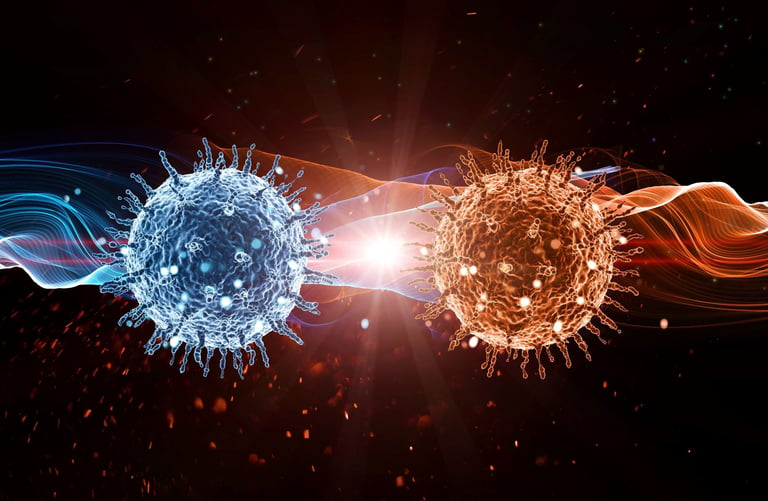Cloning Organs for Transplants: The Future of Medical Ethics and Innovation.
Cloning Organs for Transplants: The Future of Medical Ethics and Innovation. Cloning organs for transplants could revolutionize medicine, save countless lives and render organ shortages obsolete.
HEALTH & WELLNESS
K.N.
10/2/20253 min read


A Sci-Fi Movie and Real-Life Science
Cloning organs for transplants is a controversial topic that has sparked much debate in the scientific and ethical communities. While the idea of using cloning technology to create replacement organs for individuals in need of transplants may seem like a revolutionary breakthrough. Before we can fully jump on board with this technology, there are a few things we need to think about and take into consideration.
Imagine having a clone of yourself ready to help you out if you ever needed a new heart or liver. It sounds like something out of a science fiction movie, right? Well, that's exactly what the 2005 movie called "The Island" was all about. In the movie, Scarlett Johansson and Ewan McGregor played characters who had clones of themselves. The purpose of creating these clones was to ensure that spare body parts were readily available for the main characters.
Therapeutic Cloning and Its Idea
The practice of therapeutic cloning revolves around using clones as a source for organ transplants. It's a real-life scientific concept that some researchers have been exploring. The idea is to create genetically identical copies of our organs. So that if our original organs fail, we can use these clones as replacements.
One of the primary benefits of cloning organs for transplants is the potential. To eliminate long waiting lists for organ donations. Currently, there is a severe shortage of donor organs, and many patients die while waiting for a suitable match. Cloning technology could provide a sustainable and efficient solution to this problem. By allowing for the creation of customized organs that are a perfect match for the recipient's immune system.
Additionally, cloning organs for transplants could reduce the risk of rejection and post-transplant complications. Since the cloned organs would be genetically identical to the recipient's own cells, there would be less likelihood of the body rejecting the new organ. So, this could lead to better outcomes for transplant recipients and reduce the need for immunosuppressive medications, which can have harmful side effects.
The Dark Side of Cloning
The use of cloning technology for organ transplants raises complex ethical dilemmas. And sparks heated debates among healthcare professionals, policymakers, and the general public. Addressing these ethical considerations is crucial to ensuring that organ cloning research progresses in an ethical and responsible manner.
Critics argue that creating and destroying embryos for the purpose of harvesting organs raises serious moral questions about the value of human life. There are also concerns about the potential for exploitation of vulnerable populations, as well as the implications for the future of human genetic engineering.
How Does Therapeutic Cloning Work?
Therapeutic cloning involves using a technique called somatic cell nuclear transfer (SCNT). Here's how it works:
Scientists take a cell from the person who needs the organ transplant. This cell is called a somatic cell.
They remove the nucleus of the somatic cell, which contains the person's DNA.
Then, they take an egg cell from a female donor and remove its nucleus.
The nucleus of the somatic cell is inserted into the egg cell, which now contains the person's DNA.
The egg cell is then stimulated to start dividing and growing into an embryo.
After some time, the embryo develops into an organ that is genetically identical to the person who needs the transplant.
The Challenges and Controversies
While therapeutic cloning may sound promising, there are still many challenges and controversies surrounding it. Some of the main concerns include:
Ethical concerns: Cloning raises ethical questions about the value and treatment of clones.
Safety concerns: Cloning can be risky, so it's crucial to make sure both the clones and the person getting the transplant are safe.
Success rate: The success rate of therapeutic cloning is still quite low, and more research is needed to improve it.
Conclusion
So, while cloning organs for transplants holds great promise for addressing the current shortage of donor organs and improving outcomes for transplant recipients, there are important ethical considerations that must be carefully considered before this technology can be widely adopted. We must make sure we're careful and balanced when it comes to cloning organs for transplants. And we need to get all the benefits while also keeping the risks and ethical stuff in check. Only through continued research, dialogue, and ethical oversight can we determine the appropriate role of cloning technology in the field of organ transplantation.
Thanks for reading
Subscribe, read new articles and support our work along the way.
Similar Posts
Life Is Tough Make It Chillable!
LITMICH © 2025. All rights reserved.


Please follow us & like us:
Contact Us
